Ludmilla Tchérina(1924-2004)
- Actress
- Additional Crew
- Producer
Best remembered on film for her dance and art films, petite (5'3"), porcelain-skinned, raven-haired Ludmilla Tchérina, a grande dame of the international dance world as both dancer and choreographer, was born in Paris. The daughter of exiled Georgian Prince Avenir Tchemerzine (a general) and Frenchwoman Stéphane Finette, little Monique Tchemerzine began dancing at the age of three.
Showing early signs of brilliance, Ludmilla made her professional debut at age 11 and later trained at the school of the Paris Opera. In 1940 she joined Serge Lifar's Ballet Russe de Monte Carlo. Chief among her performances was her Juliet in "Romeo and Juliet" (1942), which earned her the distinction as the youngest prima ballerina in the history of dance (under the pseudonym of "Tchérzina"). In 1945 she became the principal dancer with the Ballet des Champs-Élysées and performed in various Paris concerts.
An exquisitely talented, if temperamental, performer, the exotic-eyed Ludmilla built up an international reputation throughout the 1940s and 1950s, dancing in New York, Milan, Buenos Aires, Monte Carlo and Paris. One of her great triumphs was her performance in 1957 in Claude Debussy's ''Martyrdom of St. Sebastian,'' a piece combining music, dance and drama. Afforded the luxury and freedom to form her own experimental dance company in 1959, she went on to dance at the Bolshoi Theater in Moscow the following year.
Ludmilla was 21 when she was offered her very first film role as the coldly unsympathetic ballerina Karin in the French drama Un revenant (1946) (A Lover's Return) showcasing French star Louis Jouvet. In 1948, she made her British film bow as Irina in the stylized fairy tale classic The Red Shoes (1948) starring lovely redhead Moira Shearer. She returned to French filming, however, with the comedy Fandango (1948); the melodrama La belle que voilà (1950) starring Michèle Morgan and Henri Vidal; the lead role of a woman torn between two men, a doctor Victor Francen and her husband Gérard Landry, in the dramatic La nuit s'achève (1950) (The Night Ends); the title role in the romantic drama Clara de Montargis (1951); and the romantic fantasy The Evil Forest (1952) based on the Wagnerian opera "Parsifal." A noted highlight among her films during this time was her glorious performance as Giulietta in composer Jacques Offenbach's filmed operetta The Tales of Hoffmann (1951) also starring Moira Shearer and directed by the celebrated team of Michael Powell and Emeric Pressburger.
Several of the above films mentioned above featured Ludmilla's husband and frequent partner, actor/dancer/choreographer Edmond Audran. On July 19, 1951, shortly after the filming of Hoffman, her husband was tragically killed in a road accident. The grief-stricken ballerina-star went into deep seclusion, but was persuaded to return to her art form by her second husband, Raymond Roi, a wealthy financier and industrialist. They married on May 28, 1953.
Following leads in Grand gala (1952) with Odile Versois, the Italian peplum film Spartaco (1953) and as a dancing Mata Hari's Daughter (1954), international interest unfolded. In particular, Ludmilla's superb work in The Tales of Hoffmann (1951) perked up the eyes and ears of Hollywood and she made her American movie debut as a beautiful princess opposite handsome centurion Jeff Chandler in Sign of the Pagan (1954), the biographical tale of Attila the Hun. In the film, Ludmilla performed a straight dramatic role and highlighted the film with an interpretative dance. This marked her first departure from classical ballet.
Directed by Douglas Sirk and also starring Jack Palance as the barbarous Hun ruler, the movie was met with lackluster reviews and received little attention. Ludmilla's Hollywood career ended before it began. She next filmed in England for Michael Powell/Emeric Pressburger starring in the charming Viennese musical Oh... Rosalinda!! (1955) as the title object of attention. With major appearances by Mel Ferrer, Michael Redgrave Anthony Quayle, Dennis Price and Anton Walbrook (as The Bat), Ludmilla displayed a comic flair in the title role. The film, an updated version of the Johann Strauss operetta "Die Fledermaus," (The Bat) was met with lackluster indifference as well.
Ludmilla would appear less and less in films at this juncture. A few years later she co-starred with darkly handsome Anthony Steel in the dancing travelogue Honeymoon (1959), and English/Spanish co-production directed and co-written by Michael Powell without Pressburger. Highlighted is her duet dance with the famed Spanish flamenco dancer [link-nm0031364]. A few years after that she starred in Les amants de Teruel (1962) (The Lovers of Tereul), another highly surreal art piece.
After a decade of near absence, having devoted herself to writing, as well as painting and sculpting (she exhibited many pieces at various prestigious galleries), Ludmilla filmed and starred in several classical French TV movies -- Salomé (1969), La dame aux camélias (1972), La reine de Saba (1975) and La passion d'Anna Karénine (1975). In 1970, she found she could still enthrall audiences, as she did with her dance performance in "Joan of Arc at the Stake."
Decorated with the Officier, Légion d'honneur in 1980, Ludmilla also penned two novels: "L'amour au miroir" (1983) and "La femme a l'envers (1986). She died in Paris at age 79 on March 29, 2004, and was survived by her second husband.
Showing early signs of brilliance, Ludmilla made her professional debut at age 11 and later trained at the school of the Paris Opera. In 1940 she joined Serge Lifar's Ballet Russe de Monte Carlo. Chief among her performances was her Juliet in "Romeo and Juliet" (1942), which earned her the distinction as the youngest prima ballerina in the history of dance (under the pseudonym of "Tchérzina"). In 1945 she became the principal dancer with the Ballet des Champs-Élysées and performed in various Paris concerts.
An exquisitely talented, if temperamental, performer, the exotic-eyed Ludmilla built up an international reputation throughout the 1940s and 1950s, dancing in New York, Milan, Buenos Aires, Monte Carlo and Paris. One of her great triumphs was her performance in 1957 in Claude Debussy's ''Martyrdom of St. Sebastian,'' a piece combining music, dance and drama. Afforded the luxury and freedom to form her own experimental dance company in 1959, she went on to dance at the Bolshoi Theater in Moscow the following year.
Ludmilla was 21 when she was offered her very first film role as the coldly unsympathetic ballerina Karin in the French drama Un revenant (1946) (A Lover's Return) showcasing French star Louis Jouvet. In 1948, she made her British film bow as Irina in the stylized fairy tale classic The Red Shoes (1948) starring lovely redhead Moira Shearer. She returned to French filming, however, with the comedy Fandango (1948); the melodrama La belle que voilà (1950) starring Michèle Morgan and Henri Vidal; the lead role of a woman torn between two men, a doctor Victor Francen and her husband Gérard Landry, in the dramatic La nuit s'achève (1950) (The Night Ends); the title role in the romantic drama Clara de Montargis (1951); and the romantic fantasy The Evil Forest (1952) based on the Wagnerian opera "Parsifal." A noted highlight among her films during this time was her glorious performance as Giulietta in composer Jacques Offenbach's filmed operetta The Tales of Hoffmann (1951) also starring Moira Shearer and directed by the celebrated team of Michael Powell and Emeric Pressburger.
Several of the above films mentioned above featured Ludmilla's husband and frequent partner, actor/dancer/choreographer Edmond Audran. On July 19, 1951, shortly after the filming of Hoffman, her husband was tragically killed in a road accident. The grief-stricken ballerina-star went into deep seclusion, but was persuaded to return to her art form by her second husband, Raymond Roi, a wealthy financier and industrialist. They married on May 28, 1953.
Following leads in Grand gala (1952) with Odile Versois, the Italian peplum film Spartaco (1953) and as a dancing Mata Hari's Daughter (1954), international interest unfolded. In particular, Ludmilla's superb work in The Tales of Hoffmann (1951) perked up the eyes and ears of Hollywood and she made her American movie debut as a beautiful princess opposite handsome centurion Jeff Chandler in Sign of the Pagan (1954), the biographical tale of Attila the Hun. In the film, Ludmilla performed a straight dramatic role and highlighted the film with an interpretative dance. This marked her first departure from classical ballet.
Directed by Douglas Sirk and also starring Jack Palance as the barbarous Hun ruler, the movie was met with lackluster reviews and received little attention. Ludmilla's Hollywood career ended before it began. She next filmed in England for Michael Powell/Emeric Pressburger starring in the charming Viennese musical Oh... Rosalinda!! (1955) as the title object of attention. With major appearances by Mel Ferrer, Michael Redgrave Anthony Quayle, Dennis Price and Anton Walbrook (as The Bat), Ludmilla displayed a comic flair in the title role. The film, an updated version of the Johann Strauss operetta "Die Fledermaus," (The Bat) was met with lackluster indifference as well.
Ludmilla would appear less and less in films at this juncture. A few years later she co-starred with darkly handsome Anthony Steel in the dancing travelogue Honeymoon (1959), and English/Spanish co-production directed and co-written by Michael Powell without Pressburger. Highlighted is her duet dance with the famed Spanish flamenco dancer [link-nm0031364]. A few years after that she starred in Les amants de Teruel (1962) (The Lovers of Tereul), another highly surreal art piece.
After a decade of near absence, having devoted herself to writing, as well as painting and sculpting (she exhibited many pieces at various prestigious galleries), Ludmilla filmed and starred in several classical French TV movies -- Salomé (1969), La dame aux camélias (1972), La reine de Saba (1975) and La passion d'Anna Karénine (1975). In 1970, she found she could still enthrall audiences, as she did with her dance performance in "Joan of Arc at the Stake."
Decorated with the Officier, Légion d'honneur in 1980, Ludmilla also penned two novels: "L'amour au miroir" (1983) and "La femme a l'envers (1986). She died in Paris at age 79 on March 29, 2004, and was survived by her second husband.

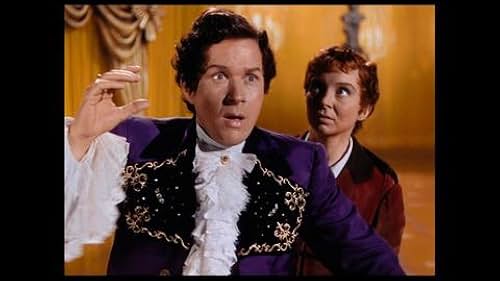
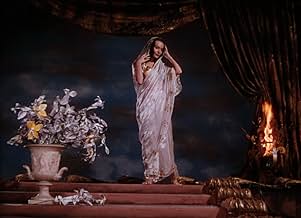
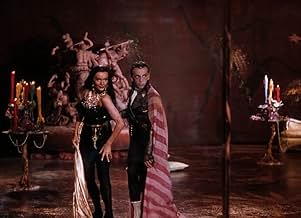
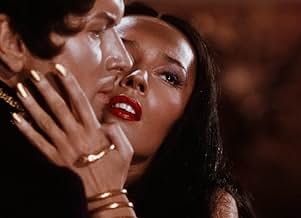
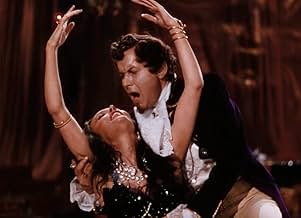
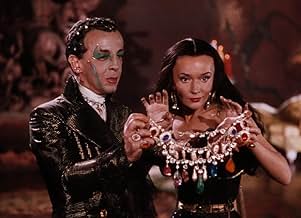
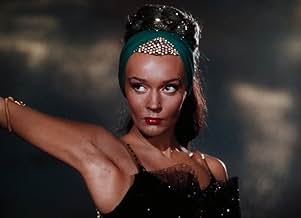
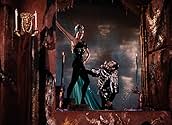


















![The Red Shoes: [Blu Ray]](https://m.media-amazon.com/images/M/MV5BYjBlMDIzZTEtNTQyZS00Mjg2LTllNjQtMWZlN2NiZWQ3ZmU2XkEyXkFqcGdeQXVyNzU1NzE3NTg@._V1_QL75_UX500_CR0,47,500,281_.jpg)